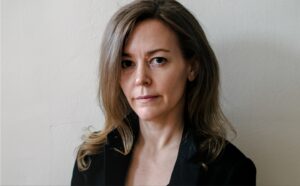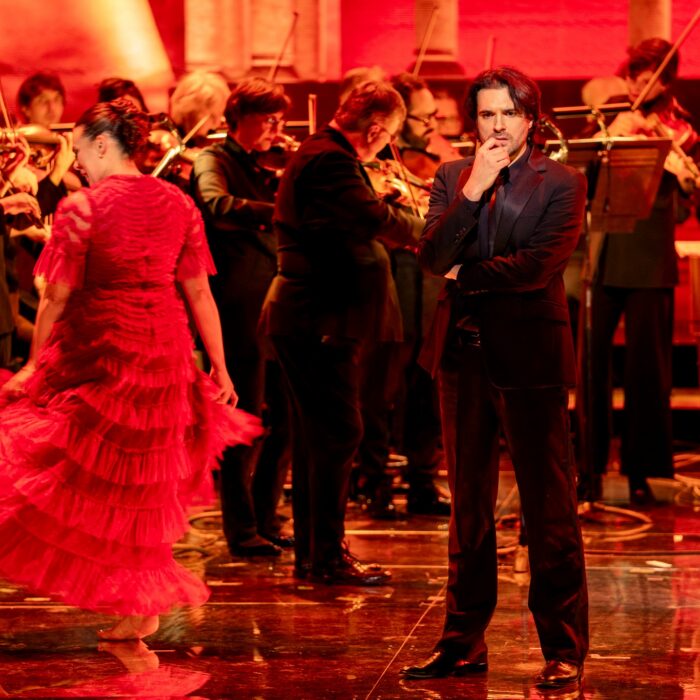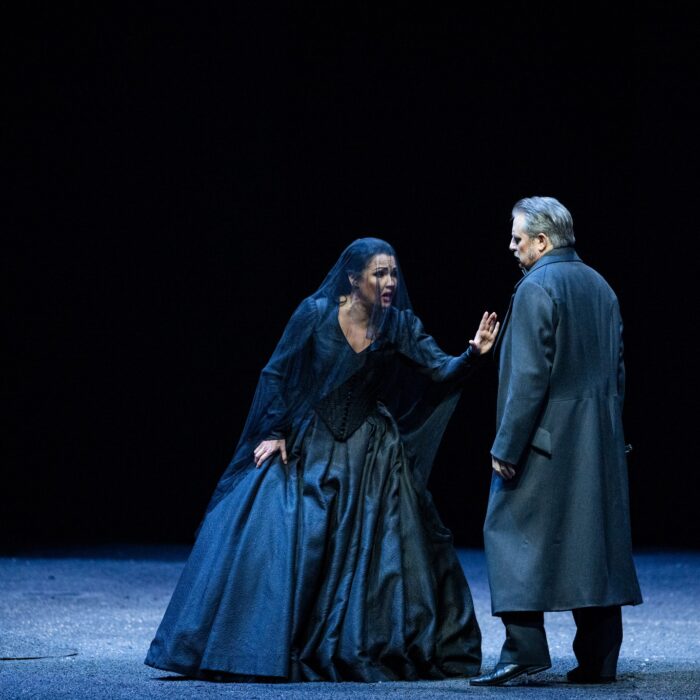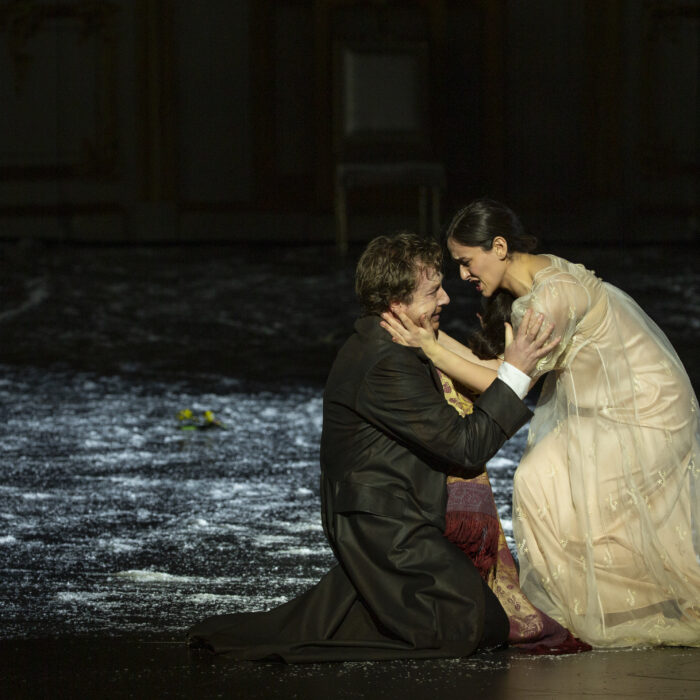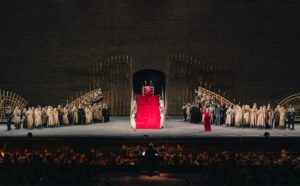
Macerata Opera Festival 2025 Review: Macbeth
Production Including Macerata’s Local Artistic Atmosphere & Sferisterio Arena’s Aesthetics Creates a Multidimensional Display of Contemporary Art & Vocal Performance
By Jennifer Pyron(Photo: Alia Simoncini)
Giuseppe Verdi’s “Macbeth,” with libretto by Francesco Maria Piave, is based on William Shakespeare’s “The Tragedy of Macbeth” (1606) and was first performed in Florence at Teatro della Pergola on March 14, 1847. This year, for Macerata Opera Festival’s 61st season, the opera is revived by Federico Gagliardi along with Director Emma Dante and Conductor Fabrizio Maria Carminati. The production also includes set designs by Carmine Maringola, costumes by Vanessa Sannino and costume assistant Margherita Platè, lighting by Christian Zucaro, choreography by Manuela Lo Sicco, master-of-arms Sandro Maria Campagna, and Assistant Director Roberto Tusa.
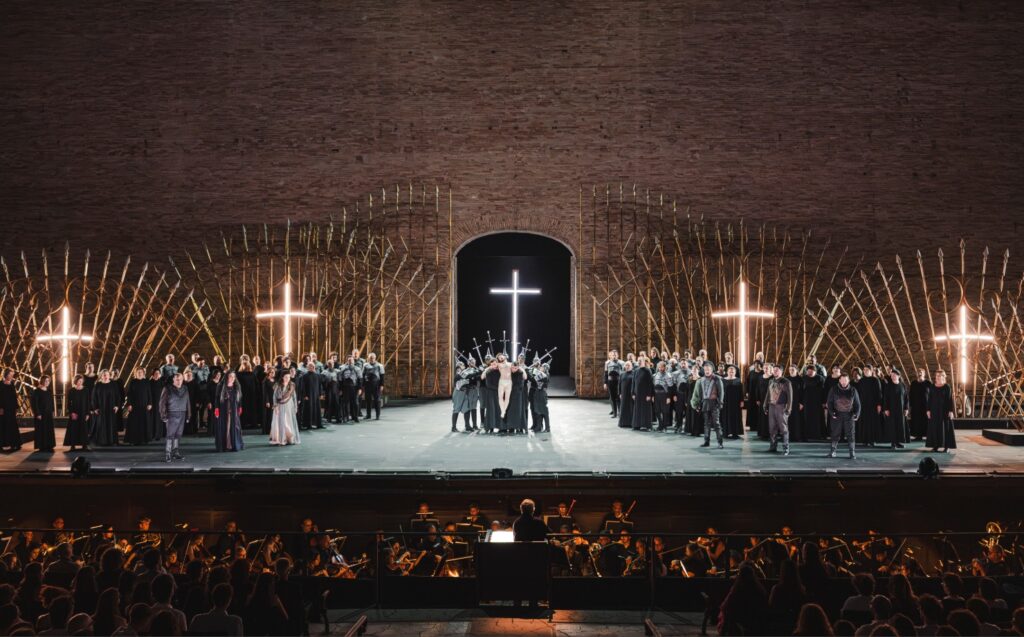
(Photo: Alia Simoncini)
The opera takes place in four acts in co-production with the Arena Sferisterio Association, the Teatro Massimo of Palermo and the Teatro Regio of Turin. The FORM-Orchestra Filarmonica Marchigiana, and Marche Opera Choir “Vincenzo Bellini” featuring Choirmaster Christian Starinieri were also key to this production’s success. Actors included Angelica Dipace, Arabella Scalisi, Caterina Bernardi, Daniele Savarino, Davide Riboldi, Davide Tagliavini, Enrico Lodovisi, Giuseppe Marino, Ilaria Cecere, Ivano Bruner, Lucia Cinquegrana, Ludovica Taurisano, Manuela Boncaldo, Mariangela Massarelli, Marta Franceschelli, Michela Lo Preiato, Miriam Russo, Paola Foresi, Roberto Galbo, Rita Russo, Sara Valenti, Samuel Salamone, Serena Lauro, Silvia Di Giovanna, Silvia Giuffré, Simona Sciarabba, Valentina Clementi, and Verdy Antsiou. Extras included Andrea Alaia, Andrea Morisco, Alessandro Giustozzi, Alessio Ferranti, Domenico Travaglini, Elia Stacey Marchegiani (child), Gian Marco Gasparrini, Iacopo Altarocca, Leonardo Menini, Lorenzo Caprari, Lorenzo Gentili, Lorenzo Macedoni, Lorenzo Muscolini, Marco Sciamanna, Mattia Crescenzi, Mauro Procacci, Maurizio Staffolani, Riccardo Ciabò, and Riccardo Ciampitti (child).
This season’s Macerata Opera Festival production of “Macbeth” incorporates Macerata’s local artistic atmosphere and Sferisterio Arena’s aesthetics to create a multidimensional display of contemporary art and vocal performance. OperaWire attended “Rigoletto” and “La Vedova Allegra (The Merry Widow)” on the previous nights, making this production the perfect ending to a most captivating 61st season.
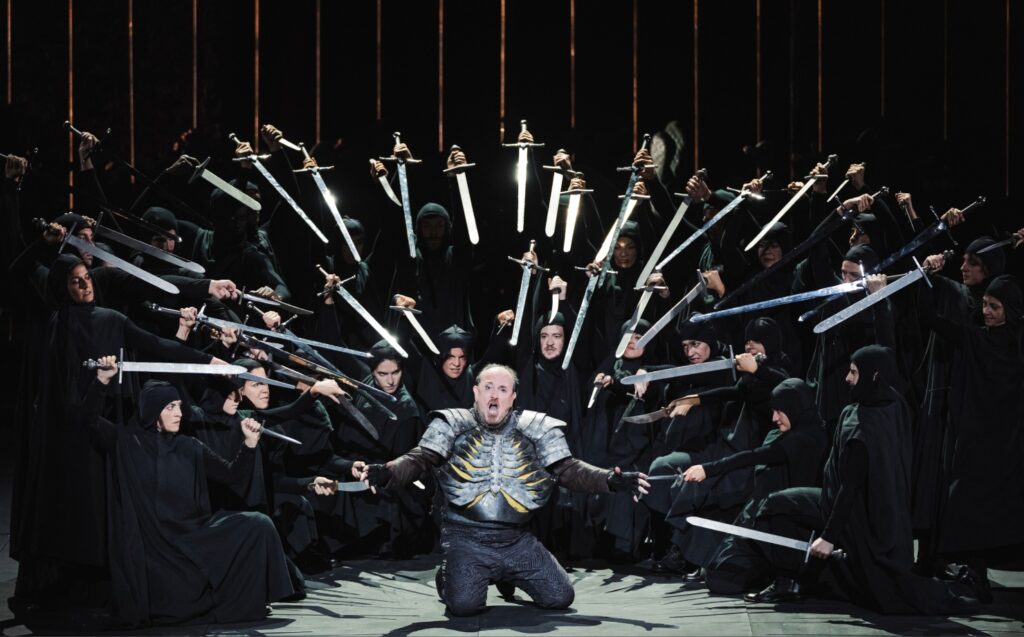
(Photo: Alia Simoncini)
Production Details
The Overture of this production was wild — literally. The entire audience was on the edge of their seats as they watched witches take over the stage and do everything imaginable to shock, stun, and spew as they satiated beliefs surrounding a series of incestuous and perverse practices. The actors were purposefully over-the-top in their reaching for intense shock-value: at one point they imitated female witches giving birth to then immediately sacrifice their babies.
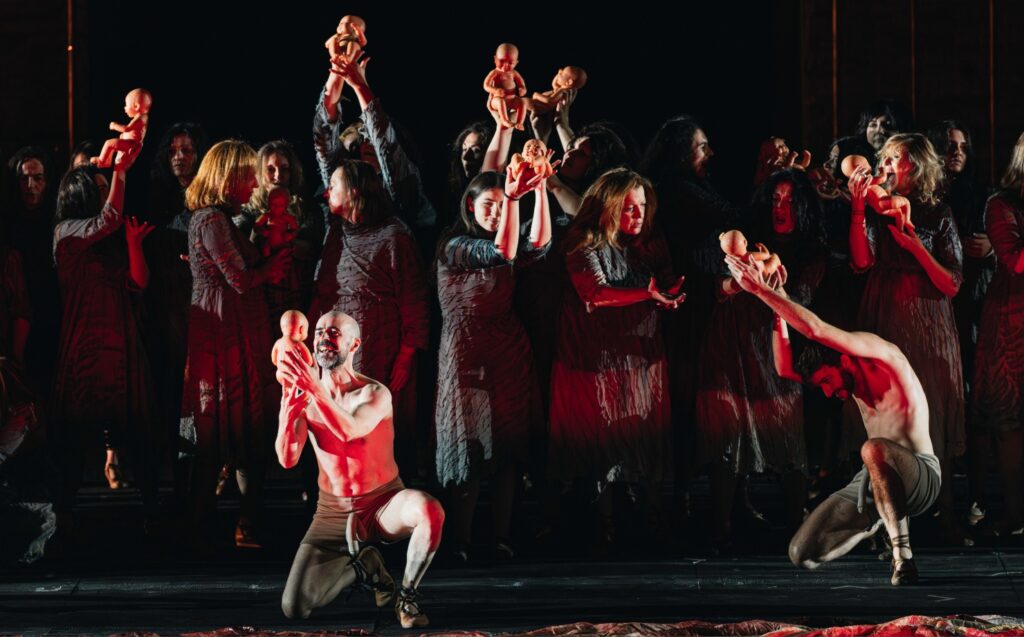
(Photo: Alia Simoncini)
This stage direction was all a setup for the darkest moments, reminding everyone of what Shakespeare’s “Macbeth” is all about – the tragedy of power in the form of crime and punishment. The blood spilling and damned lives of the greedy are under a microscope in this synopsis, leaving everyone in a state of paranoia. Verdi’s “Macbeth” illuminates this and is known as one of opera’s most important works (potentially one of the most beloved operas of all time). It requires teams of creative support and production to make a large-scale “Macbeth” even possible. This year’s local community of artists came together to unfailingly revive a moment of historical importance.
Franco Vassallo as Macbeth
Baritone Franco Vassallo as Macbeth was outstanding in the role. His voice was unforgettable in its resonance and full-bodied timbre. His opening duets with Banquo, as leaders of the Scottish Army, ‘Giorno non vidi mai si fiero’ and ‘Due vaticini compiuti or sono,’ featured his solid vocal technique and unwavering hunger for power — a lust arising from his guts after the local witches address Macbeth as Thane of Cawdor and King of Scotland and Banquo as ‘the father of kings.’ Vassallo trembled with fear and desire when singing about how his takeover and crowning achievements would mark history forever. All the while, questions spiraled in the back of his mind about why the witches foresaw Banquo as the father of kings, and not himself.
Macbeth then sends a letter to Lady Macbeth about these events. She reads and decides to be loyal to her own ambitions for power. King Duncan of Scotland will soon arrive at the castle, and when Macbeth enters, Lady Macbeth informs him how they need to murder King Duncan. Soon after this, Macbeth envisions a dagger. He sees his only way forward in achieving the crown (and fulfilling the prophecy of the witches) is to murder the king. He takes matters into his own hands and does it. Upon his return, he describes to Lady Macbeth how the murder terrifies him. Her lust for power has already surpassed his and she tells him to have more courage and conviction. Once they leave, Banquo enters with Macduff, a nobleman, who discovers the murder. Macbeth and Lady Macbeth act in visible shock to the king’s murder, while deciding to hide their plot no matter the cost of lives in a ‘cursed land.’
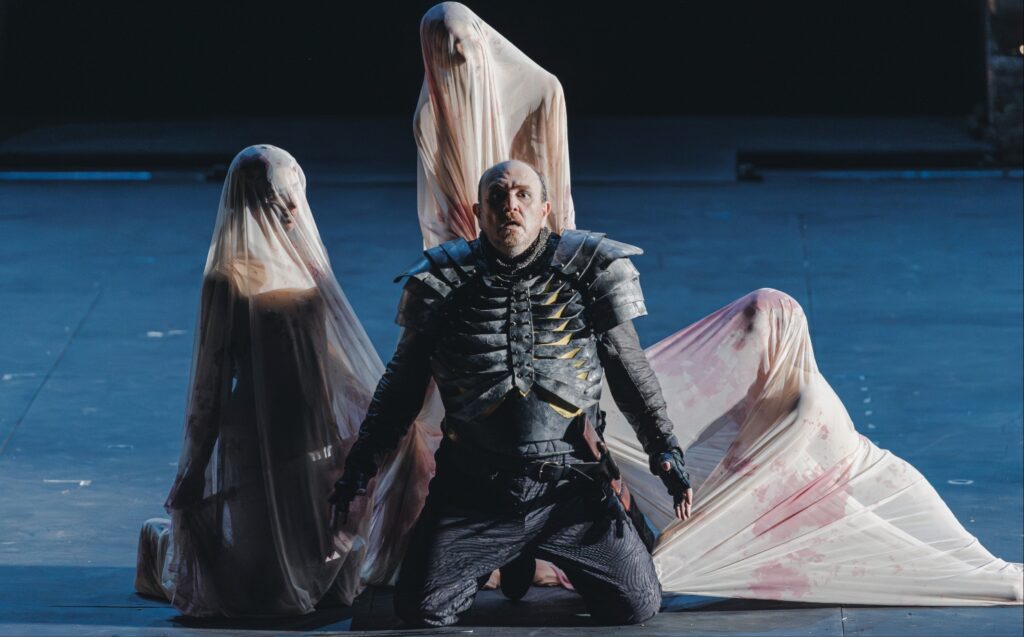
(Photo: Alia Simoncini)
Vassallo’s duet with Lady Macbeth, ‘Or tutti sorgete,’ was thrilling! The chemistry between the two continued to build as a festering psychosis took hold inside them. It was Vassallo’s vocal performance during ‘Sappia la sposa mia,’ ‘Mi si affaccia un pugnal?,’ ‘Regna il sonno su tutti,’ and ‘Fatal mia donna,’ that made this “Macbeth” jaw-dropping. Vassallo’s vocal climactic arc was refined and intelligent in its delivery and performance. He lead the night along with Conductor Carminati, highlighting the undeniable beauty of Verdi’s score. It felt as though the walls of the Sferisterio Arena were full of Vassallo’s tightening grip on ‘true power’ and the discourse that arises when ‘achieving it.’
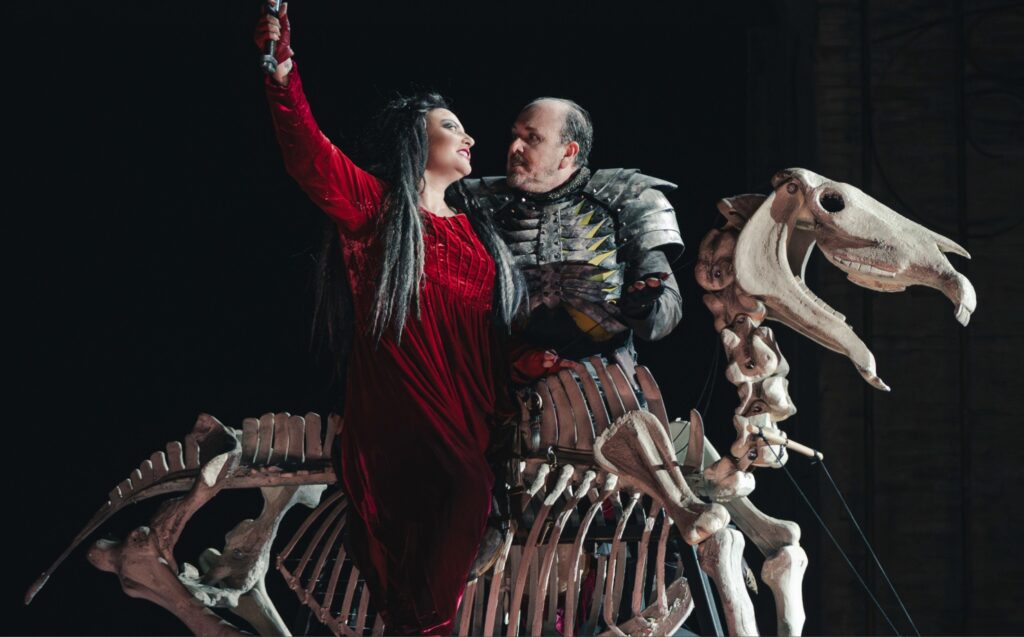
(Photo: Alia Simoncini)
There were also moments of tremendous effort from the actors that brought this production to life, including the use of large painted canvases that stretched for several yards when fully released. They billowed above the bodies of the actors underneath and it was as if there was a bloody heart that grew before the audience’s eyes, symbolizing the blood spilled by Macbeth and Lady Macbeth throughout the opera. Some actors even pressed their faces up against the canvas in a haunting effect that still resonates post-performance.
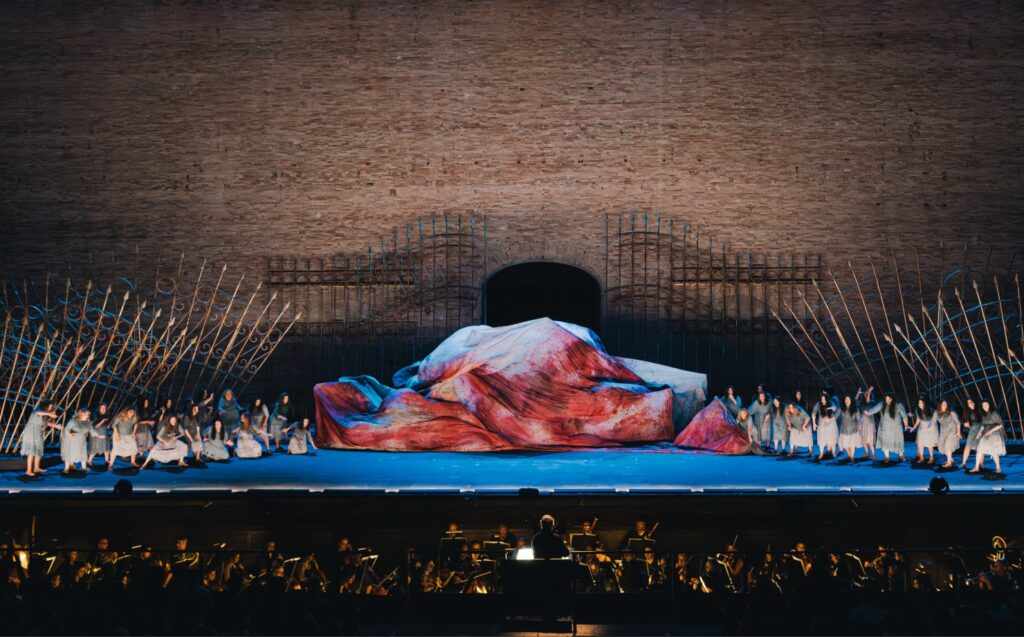
(Photo: Alia Simoncini)
Marta Torbidoni as Lady Macbeth
Soprano Marta Torbidoni as Lady Macbeth was the shining star of the evening with a vocal performance that surpassed expectations. Torbidoni’s voice was a force to be reckoned with as Lady Macbeth became overwhelmed with her hunger for greater power and control, especially in the wake of her consumptive paranoia. Nothing and no-one could stand in her presence without being demolished by her ambitions. This eventually devolved into weakness as her own psychosis began to consume her. Observing Torbidoni as she performed her arias, ‘Nel di della vittoria,’ ‘Ambizioso spirito,’ and ‘Vieni t’affretta,’ was revolutionary. She created a universe as Lady Macbeth that expanded and spiraled into oblivion just as Verdi’s score demands of her. Her vocal performance mirrored Verdi’s embodiment of “Macbeth” with thoughtfulness and a clear understanding of her purpose.
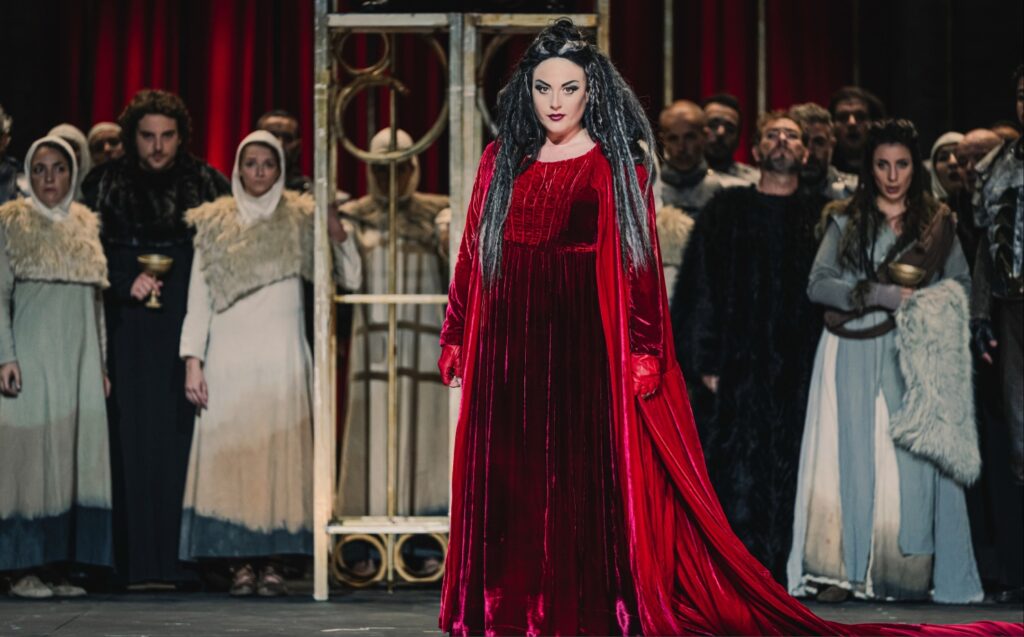
(Photo: Alia Simoncini)
Torbidoni continued to stun the audience as she performed her arias, ‘Fatal mia donna’ in duet with Vassallo, ‘La luce langue,’ and ‘Si colmi il calice.’ Her high notes during ‘Si colmi il calice’ were bone chilling and breathtaking. She had already established herself as vocally proficient in her middle range and lower register, however this particular aria resonated like none before. The audience almost went into standing ovation after her performance of it. Torbidoni knows how to ‘strike when it is hot’ and this served her tremendously well when carving out her portrayal of Lady Macbeth, potentially placing her performance a bar above even the best singers to date.
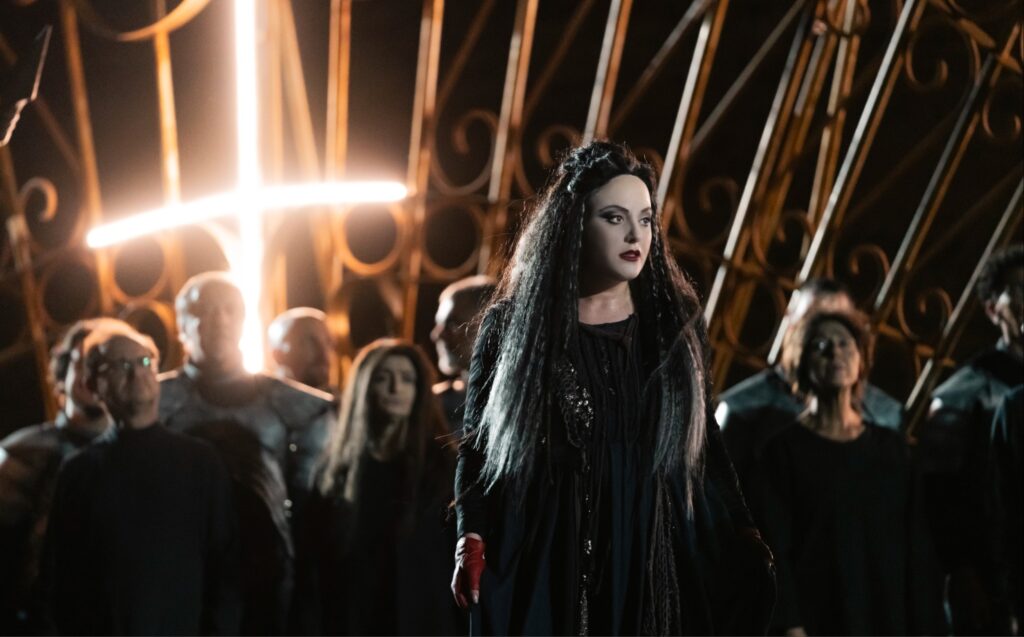
(Photo: Alia Simoncini)
The opera’s most famous quartet, ‘Sangue a me quell ombra,’ was a historical moment illuminating the high vocal quality of this particular cast. However, what stood out the most was Torbidoni’s voice as it haunted and transported the audience in Lady Macbeth’s struggle to reckon with apparitions, justifying the wicked murders driven by desires of power for ultimate reign.
Stellar Cast Highlights
Simón Orfila as Banquo rose to the physical challenges of this production in many ways. His acting skills provided him with intentional movement that set him apart from the rest of the cast. Every move Orfila made onstage was purposeful and aligned with where he was going in his character’s development. Most of the time acting is an after-thought to singing, however Orfila really showcased how acting is at the forefront of what makes a singer a remarkable performer.
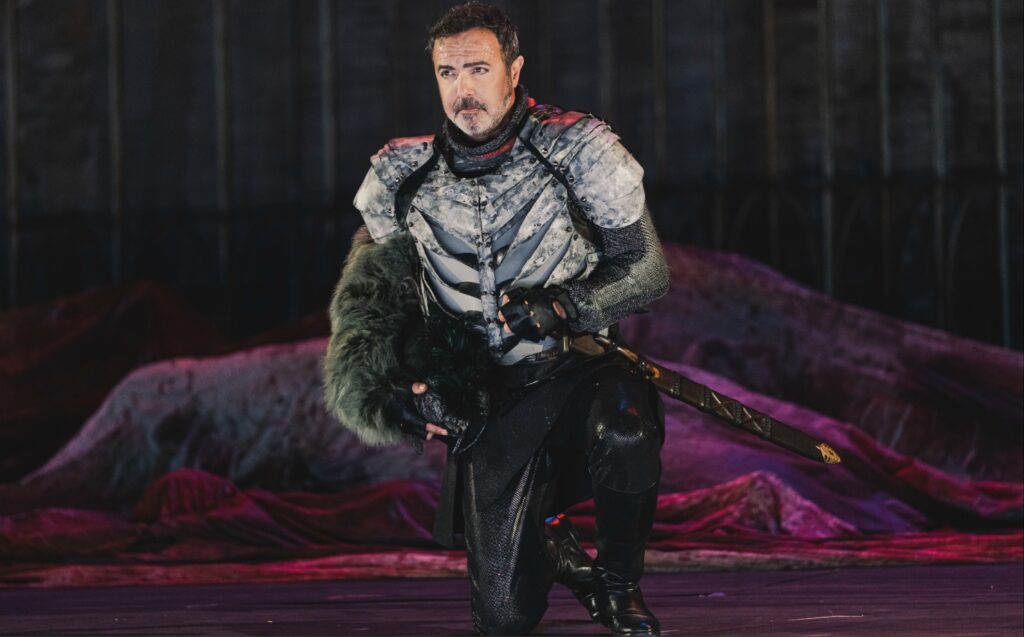
(Photo: Alia Simoncini)
Orfila’s main arias, ‘Studia il passo’ and ‘Come dal ciel precipita,’ reveal his intensity when caring for his son’s future and surviving Scotland’s crushing new reality following the murder of King Duncan, where the lust for power has become a volatile disease. Orfila’s sense of urgency made his point clear in his role, and his voice reflected this in its remarkable agility and transparency of emotion. Not many singers can balance a physical role with a beautiful vocal performance: this is why Orfila made such a strong impression all around.
Federica Sardella as Lady Macbeth’s Lady was steadfast in her care and concern for Lady Macbeth as she plunged into her own demise. Sardella made a strong impression onstage with her natural acting skills. She came across as organic in her delivery.
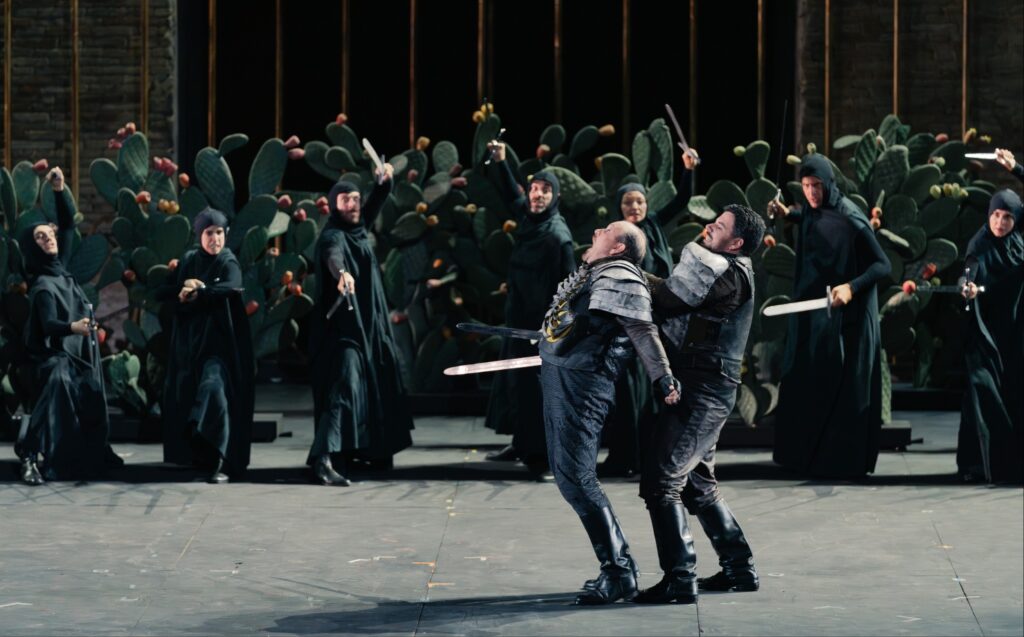
(Photo: Alia Simoncini)
Antonio Poli as Macduff made notable efforts to confront Macbeth and proclaim Malcolm king of Scotland. Poli’s vocal performance and acting aligned with Verdi’s overall theme of crime and punishment to a degree that made the audience jump in their seats, especially when he murdered Macbeth. Poli’s climactic arc of discovery in his role left a memorable mark.
Oronzo D’Urso as Malcolm was an excellent choice for this role. Luca Park as Medico was a great addition to the cast. I was still taken with his performance as Sparafucile in Verdi’s “Rigoletto” from the previous night. Stefano Gennari as Servant/Hitman/Herald, Andrea Pistolesi as First Apparition, and Lucia Spreca as Second and Third Apparition made this production’s cast well-rounded and exceptionally talented.
Unforgettable Moments
There were two eye-catching scenes in this production that absolutely made “Macbeth” the most memorable production of this season. The first took place when King Duncan’s murder was discovered and his ceremony as a sacrifice became a stand-out and stand-alone event: it was a very scenic gathering where a large LED cross dominated the stage.

(Photo: Alia Simoncini)
The second was when Macbeth became king and a red sheet draped eerily down the front of his risen platform, making him seem invincible and radically dangerous in his newly appointed power.
More Creative Details
This production would not have been possible in its remarkable delivery without the support of its intelligent creative team including Stage Manager Lucia Amarilli Sala, Assistant Stage Managers Alessio Parisi and Irene Carera, Hall Master Claudia Foresi, Stage Masters Alessandro Zilioli, Manuela Belluccini, and Irene Filiaggi, and Light Master Melissa Mastrolorenzi, with surtitles by Chiara Vallati.
The scenes, costumes, and props were provided by Macerata Opera Festival, Teatro Massimo di Palermo, and Teatro Regio di Torino, making this “Macbeth” one for the history books.
